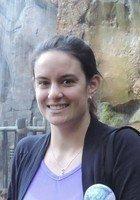Connect with hundreds of tutors like Melissa
Who needs tutoring?
FEATURED BY
TUTORS FROM
- YaleUniversity
- PrincetonUniversity
- StanfordUniversity
- CornellUniversity

Melissa
About Me
I believe that everyone has a story. We can enjoy them all if we're willing to listen and just "be" in the moment. There are many times when I shake my head and think to myself "only me". I find shenanigans in the most unlikely places, I'm always being told not to make friends in the grocery, and I am a huge nerd (self proclaimed). I am married, and I have five children. All of my children have four feet and tails (betcha I got you for a second). I have two dogs and three cats. I am interested in all things crafty, and I spend more time on Pinterest than I'd care to admit. I love making things, and I take great joy in spending hours in the craft studio that is set up in my basement. I also love shoes. I have a Carrie Bradshaw sized obsession, and although I couldn't draw you a house with all the tools in the world, I can sketch outlines of shoes and have several in a book. In my next life, I want to design them. I also love being outside, and when the weather is nice, you can find me on the deck, in my hammock with a book, my notebook, and sun tea. I also obnoxiously take pictures of everything. I started writing when I was in middle school, and I have not stopped since. I used to write stories about my friends and I would often type them (on a TYPEWRITER!) and give them as gifts. My family didn't own a computer until I was in high school. I continue to write flash fiction and poetry as well as creative non-fiction. I have been to several writers' retreats and I was a summer fellow last year in the Meadowbrook Writing Project. I detest the poetry of T.S. Eliot, but I owe him for the day I decided to go to graduate school. I felt changed after leaving a modern poetry class one day, and I credit that class with helping to turn the tide for me. My favorite writers include James Joyce (although I have not finished Ulysses), Sylvia Plath, and I adore Frank McCourt. I also enjoy some more modern fiction, and some of my favorites are Cecelia Ahern and Marissa de los Santos. I teach writing, and there is not another job in this world that I ever want to do. I am a writer, and that's what makes me whole.
Education & Certifications
Q&A with Melissa
Connect with a tutor like Melissa
Connect with a tutor like Melissa
Tutors with Similar Experience

Joseph
10+ YearsMoravian College and Moravian Theological Seminary
Bachelors, Political Science/Math
View Profile
